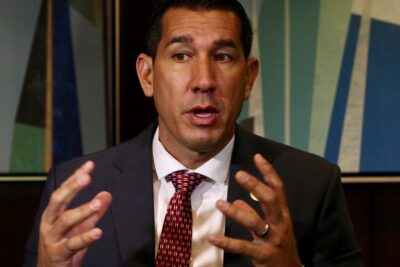WASHINGTON — Hawaii’s Democratic congressmen, Ed Case and Kai Kahele, have competing views on whether incarcerated felons should be allowed to vote.
Late Wednesday the House passed the “For the People Act,” a sweeping package of reform measures meant to expand voting rights, reduce the influence of money in politics and heighten ethics standards, including for U.S. Supreme Court justices.
Both Case and Kahele voted in favor of the measure, which passed 220-210, almost entirely along party lines.

A view from inside the Halawa Correctional Facility on Oahu.
Cory Lum/Civil Beat
Where they differed, however, was on an amendment — proposed by newly elected members, Cori Bush and Mondaire Jones — that sought to allow convicted felons to cast ballots while still in prison.
Kahele was one of 97 Democrats who supported the measure while Case was one of 119 who voted with 209 Republicans to tank it.
Kahele, who represents Hawaii’s 2nd Congressional District, which includes rural Oahu and the neighbor islands, issued a lengthy statement to Civil Beat explaining his vote, which is described as part of “our larger struggle to end Jim Crow-era institutional racism in our country.”
“The United States maintains the largest prison population and the highest incarceration rate in the world, and also maintains greater restrictions on voting during and after incarceration than any other democratic country in the world,” Kahele said.
“Our country’s restrictions on voting while in prison are rooted in the systems of racial prejudice that were placed on people of color after African Americans gained the right to vote following the Civil War. Disenfranchisement as a punishment for crime undermines our democracy, and it does so with a particular impact on people of color.”
Kahele is the only Native Hawaiian serving in Congress and is just the second since statehood in 1959 to represent the islands. The first was former U.S. Sen. Daniel Akaka.
Kahele said disenfranchisement laws similarly hurt Native Hawaiians, who make up a disproportionate share of the state’s prison population and are more likely to serve longer sentences than most other ethnic groups.

U.S. Rep. Kai Kahele says incarcerated felons should have the right to vote.
Nick Grube/Civil Beat
He pointed out that as a state senator he co-sponsored legislation that would have expanded voting rights in Hawaii to incarcerated individuals by allowing them to vote via absentee ballot.
“Voting is a fundamental democratic right and should be guaranteed to all citizens,” Kahele said.
In a similarly lengthy written statement, Case detailed his own opposition to the amendment, saying that as a matter of policy he doesn’t believe that all incarcerated felons should be entitled to vote regardless of the crime.
“Take an extreme example of conviction and incarceration for terrorism; I don’t believe that felon should have the right to vote,” Case said. “Loss of the franchise has long been one of the consequences of criminal convictions.
“I fully agree that the tragic inequities in our criminal justice system have had the result of lower voting rates for especially minority felons. However, I believe the way to address that is by remedying those inequities to start with rather than changing voting rights.”
Case had concerns, too, about the amendment, which was put forth on the floor, not having the opportunity for robust debate and committee consideration before final passage of the bill.
He also pointed out that the right to vote for convicted felons has long been set by each state and that at present he believes it should not be federalized.
Hawaii allows convicted felons to vote after they are no longer incarcerated. Only Maine, Vermont and Washington, D.C., allow them to vote from behind bars.
“It appears that these and other concerns were shared by many of my colleagues on both sides of the aisle,” Case said.
The congressman also touted his own amendment to the bill, which calls on the U.S. Election Assistance Commission to prepare recommendations for states to strengthen voting by mail.
Voting rights for felons was not the only topic that divided Case and Kahele. They also split over whether the voting age should be dropped to 16. Kahele was one of 125 Democrats who said “yes” while Case was one of 93 who joined with 209 Republicans to say “no.”
 Sign up for our FREE morning newsletter and face each day more informed.
Sign up for our FREE morning newsletter and face each day more informed.
"case" - Google News
March 05, 2021 at 06:53AM
https://ift.tt/3rvnwq0
Kahele, Case Divided On Whether Inmates Should Vote From Prison - Honolulu Civil Beat
"case" - Google News
https://ift.tt/37dicO5
https://ift.tt/2VTi5Ee
Bagikan Berita Ini














0 Response to "Kahele, Case Divided On Whether Inmates Should Vote From Prison - Honolulu Civil Beat"
Post a Comment